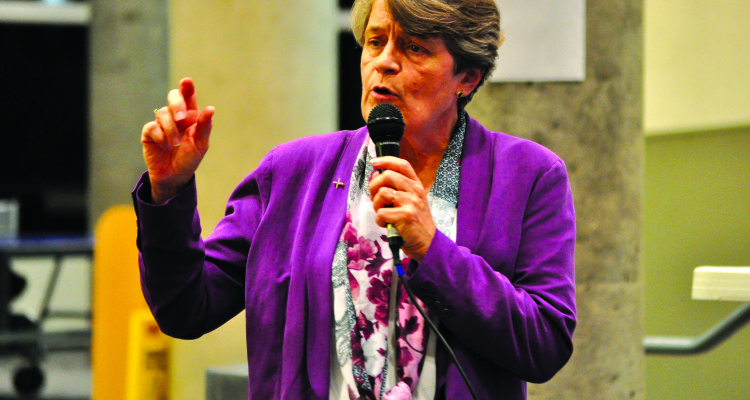
Patricia A. Daly, executive director of the Tri-State Coalition for Responsible Investment, talks about social responsibility in financial investments on Nov. 6. Tebben Gill Lopez/The Mirror
Many consumers are content in turning a blind eye to the injustices that save them cents on their dollars. While it may be challenging to understand the social responsibilities that affect the world’s most powerful corporations, one group of investors is constantly directing these corporations to increase their social responsibility: the Interfaith Center on Corporate Responsibility.
Senior economics major Arturo Jaras Watts and Fairfield University’s Proactive Investment Club organized an event on Nov. 6 to explain how to invoke social justice in corporations through financial investment. The lecture was open to all but was mostly attended by economic and business majors.
As executive director of the Tri-State Coalition for Responsible Investment – the largest regional member of the ICCR, featured speaker Patricia A. Daly knows the consequences that can come from certain companies’ financial choices.
She believes investors must know who they are investing in.
“If you’re not engaged, then you might as well sell the stock if it’s really a problem … If it’s making money, then that’s blood on your hands,” she said.
The primary focus of ICCR would be to “align their mission with the mission of their investments,” said Daly. “They’re able to ask companies to be consistent with some basic ethical and moral behavior that most companies would agree would be reasonable.”
By advocating access to health care, environmental justice, climate change issues and natural resource sustainability, ICCR is able to address the many different types of social injustice corporations are normally guilty of, according to Daly.
 ICCR was founded in 1971 when the Episcopal Church filed a shareholder resolution asking General Motors to leave South Africa in protest of the Apartheid. Today, the ICCR manages nearly 300 faith-based institutional investors that combine for an estimated $100 billion in investment portfolios.
ICCR was founded in 1971 when the Episcopal Church filed a shareholder resolution asking General Motors to leave South Africa in protest of the Apartheid. Today, the ICCR manages nearly 300 faith-based institutional investors that combine for an estimated $100 billion in investment portfolios.
“On the heels of that faith community … organizations came together to work together in an interfaith setting … knowing that if we pooled our investment power, we’d be able to leverage the power we had before companies,” said Daly.
She said: “We started working together on human rights issues, on ecological issues, all kinds of labor issues … we were introducing the issue to companies at the time.”
After working with companies for over 40 years, Daly said ICCR has “established relationships – really good and respectful dialogues with companies – really continuing to work out all of the details and the metrics of what needs to be in place for a company to truly be sustainable.”


Leave a Reply